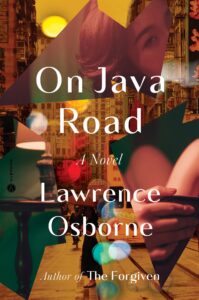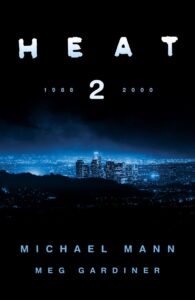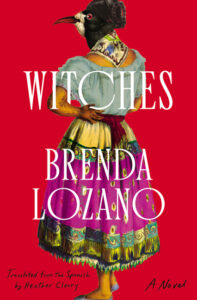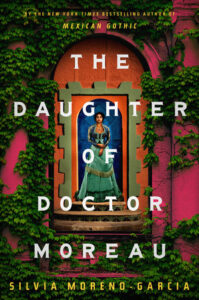A look at the month’s best reviewed crime novels, mysteries, and thrillers.

Lawrence Osborne, On Java Road
(Hogarth)
“No one else writes ‘thrillers’ as languid as Lawrence Osborne’s. His novels tend to be leisurely, slow-burn mysteries that could be mistaken for impeccably observed travel memoirs … The tale begins to move more quickly … Human nature and atmosphere will always interest Osborne more than the traditional pyrotechnics of a thriller. The palpable sense of dread that hovers over Hong Kong and Osborne’s exploration of Adrian’s own moral conundrum is what kept me turning the pages … Osborne skillfully — and with exquisite prose — probes the nexus of community and character, and how where we are shapes who we are.”
–Chris Bohjalian (New York Times Book Review)

Michael Mann and Meg Gardiner, Heat 2
(William Morrow)
“It’s a pulpy, expansive crime novel that feels of a piece with Mann’s filmography, from its hypercompetent, ambitious characters to the richly detailed underworlds they operate in … At times, Mann and Gardiner use the prequel portion of the book to directly explain the origins of iconic moments from the film, but even those instances tend to feel motivated by the story rather than like cheap ploys to get readers to do the Leo pointing meme … part of the fun of Heat 2 lies in watching its authors pull ideas and tiny details from across Mann’s entire filmography … Heat 2, though, paints complete enough portraits of its characters to allow you to imagine them separately from the stars who played them, making a film adaptation with new actors easier to imagine.”
–Chris Stanton (Vulture)

Hayley Scrivenor, Dirt Creek
(Flatiron)
“The novel’s overall narrative is written from a variety of perspectives, allowing the story to unfold organically through the insights of the main players … But what stands out the most is the use of the chorus in chapters told by the town’s children, the collective ‘we’ whose voices are conspicuously absent from grown-up conversations, but whose insights provide an unbiased clarity … The way that Scrivenor explores the bad things that happen to children through their own eyes elevates the entire novel. It’s a literary device that echoes not only the Greek chorus but writers from the contemporary canon, like Jeffrey Eugenides’ adolescent chorus in The Virgin Suicides. Here, it gives Scrivenor the opportunity to show the contradictory experiences and thoughts of children – not the same, but so often swept collectively under the rug …”
–Bec Kavanagh (The Guardian UK)

Brenda Lozano, Witches
(Catapult)
“The book is beautifully translated. Cleary advisedly leaves in Spanish terms … The biggest success of Witches is the way she weaves together two distinct voices … Though the book chronicles violence against women and those who present as women, it highlights, in both rural and urban communities, an atmosphere of freedom and mobility that is a pleasure to read about.”
–Rachel Nolan (New York Times Book Review)

Gabino Iglesias, The Devil Takes You Home
(Mulholland)
“… riveting … a barrio noir that invites readers to consider the depths of darkness in this world, its material effects, and the cycles of violence we both willingly and perforce enter into … written in both English and Spanish — the former outweighs the latter, and any Spanish dialogue too important to the plot or mood is translated — and takes readers on a journey to hell and back. Whether hell is the American racism, the Mexican cartel industry, Mario’s grief and increasing comfort with violence, or all of the above, it works … The mix of religious, superstitious, and supernatural elements add a dimension to the novel that heightens its horror, but also its social commentary … may not be a cheerful book, but it still allows glimpses of love, moments of connection, and glimmers of beauty to exist. Even if those can’t save us, they point toward what, with some effort and luck, just might.”
–Ilana Masad (NPR)

Megan Miranda, The Last to Vanish
(Scribner / Marysue Rucci Books)
“Megan Miranda knows how to land a twist, and her latest thriller demonstrates that to dizzying effect. Set in an isolated and hazardous pocket of the Appalachian Mountains, The Last to Vanish elegantly builds a near-gothic atmosphere as it tells the story of an inn with a troubled past and the locals who are keeping deadly secrets … She’s not quite an unreliable narrator but rather one whose personal details are revealed with careful precision by Miranda, who ensures that Abby is fascinating, not frustrating … A perfectly balanced cross between a cold-case mystery and a psychological thriller, The Last to Vanish‘s expert plotting and surprising twists will delight readers.”
–Elyse Discher (Bookpage)

Elizabeth Hand, Hokuloa Road
(Mulholland)
“It will take him a while to learn about mythology — and it’s a wonderful crash course for readers … the latter half of the book shifts gears to the fast-burn thriller fans will be waiting for … To describe Elizabeth Hand as a mystery writer is to not have read another Elizabeth Hand book. Over decades, she has proved that she’s eclectic, genre-bending, and comfortable in fantasy and mystery, crime, myth, magic — and more. In Hokuloa Road, she explores the rich and diverse culture and environment of Hawaii — and seamlessly stitches this fascinating material into a girl-gone-missing story. It’s refreshingly and originally creepy.”
–Karin Tanabe (Washington Post)

Silvia Moreno-Garcia, The Daughter of Doctor Moreau
(Del Rey Books)
“The imagination of Silvia Moreno-Garcia is a thing of wonder, restless and romantic, fearless in the face of genre, embracing the polarities of storytelling — the sleek and the bizarre, wild passions and deep hatreds — with cool equanimity … the novel immerses readers in the rich world of 19th-century Mexico, exploring colonialism and resistance in a compulsively readable story of a woman’s coming-of-age … The visceral horror of what Carlota has endured, combined with Moreno-Garcia’s pacing and drama, makes for a mesmerizing horror novel.”
–Danielle Trussoni (New York Times Book Review)

Dwyer Murphy, An Honest Living
(Viking Books)
“Like the best noir practitioners, Murphy uses the mystery as scaffolding to assemble a world of fallen dreams and doom-bitten characters … Murphy’s hard-boiled rendering of the city is nothing short of exquisite. It’s a landscape of reeking garbage, of salty rain sweeping off the ocean, of Midtown towers that look ‘ghostly like a mountain range,’ … For anyone who wants a portrait of this New York, few recent books have conjured it so vividly. For those who demand a straightforward mystery without any humor, romance and ambience, well, forget it, Jake, it’s literature.”
–Christopher Bollen (New York Times Book Review)

Dan Fesperman, Winter Work
(Knopf)
“The story leads to an exciting conclusion—a thoroughly surprising spin on the typical spies-on-the-run finale—but it is the relationships among the principals that give the novel its depth and power … Fesperman builds his story around the inner lives of his characters, an approach that transforms typical espionage tropes into universal human drama.”
–Bill Ott (Booklist)


















